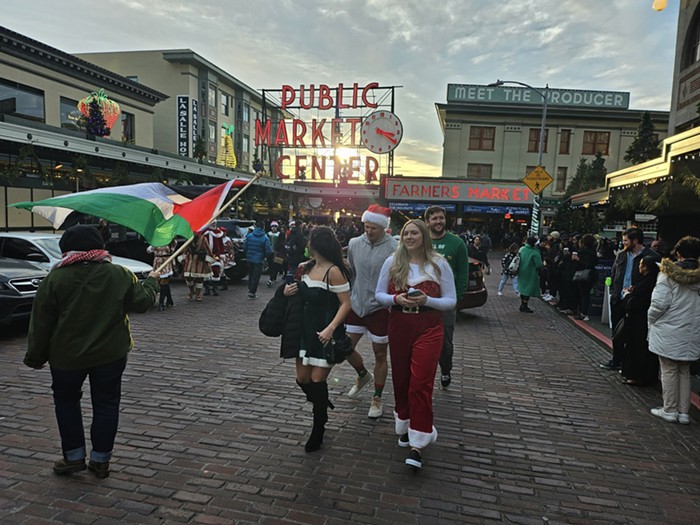Hundreds of pro-Palestine protesters marched to Pike Place Market last weekend during the height of holiday shopping season to remind consumers that “while you’re shopping, bombs are dropping” in Israel’s two-and-a-half-month deadly escalation, which has killed more than 20,000 Palestinians.
Amid Israel's genocidal campaign in Gaza, Christians in the West Bank canceled Christmas in Bethlehem, the birthplace of Jesus, as they are unable to celebrate during such devastation. In Seattle, advocates against genocide do not want the holiday season to slow their movement’s momentum or distract from the horrors in Gaza.
"It's genocide when it's Christmas, it's genocide when it's Hanukkah, it's genocide when it's Ramadan, it's genocide when it's a normal Saturday afternoon,” an organizer said to the crowd in Pike Place. “It's genocide when the world is watching and it's genocide when we pretend it's not happening."
"While you're shopping, bombs are dropping," the protesters shout, interrupting business as usual in Westlake Seattle, WA pic.twitter.com/tcdDYVza9o
— Hannah Krieg (@hannahkrieg) December 16, 2023
Usually, the weekly Saturday march, organized by Samidoun Seattle, Falastiniyat, and SUPER UW, brings protesters to the Federal Building, which houses the Seattle offices of US Sens. Patty Murray and Maria Cantwell. But with no luck pushing any member of the Washington Congressional delegation to support an immediate and permanent ceasefire besides Rep. Pramila Jayapal, organizers decided to target economic activity.
The broader movement for Palestinian liberation has long used boycotts as a strategy to cut into profits of Israeli companies and pressure non-Israeli companies to sever business relationships with Israel. The Boycott, Divest, Sanction (BDS) movement draws inspiration from boycotts exercised in the fight against South African apartheid, the Indian anti-colonial struggle, and the US civil rights movement, Vox writes.
Recently, BDS has become more mainstream. A 2022 survey conducted by the Pew Research Center found that 84% of Americans knew “not much” or “nothing at all” about BDS, but the movement appears to have picked up steam among young people on social media. Millions of videos on TikTok and infographics on Instagram encourage other users to focus pressure on McDonald’s, Starbucks, and Disney, though longtime BDS participants have also targeted Puma, SodaStream, and HP.
Some BDS participants claimed victory when sports brand Puma announced earlier this month that it would no longer sponsor Israel’s national football team in 2024. A Puma spokesperson said the company decided to end its relationship with the football team last year, unrelated to the recent re-energization of the BDS movement.

As for the Seattle organizers' recent protest at the popular tourist attraction, it is unclear if their presence impacted sales during the busy shopping weekend—Pike Place Market did not respond to my request for comment. But the action definitely disturbed the peace during the early hours of the second weekend of SantaCon. When the protesters filled the brick road of Pike Street, shoppers pulled out their phones to take photos and record videos. As shoppers, many dressed in some variation of a Santa costume, hurriedly tried to exit, protesters called on them to join their demonstration. When the crowd settled, an organizer instructed the group to shout “shame” for those who carried on as normal.
Demonstrations that dare inconvenience the average person catch flack from hand-wringers online. For example, when Jewish Voice for Peace (JVP) coordinated the closure of eight bridges across the US for the eighth night of Hanukkah, some contemplated in their think pieces whether the traffic jams won average people over or just frustrated them.
But as Samidoun Seattle wrote on Instagram, the goal is to make sure there’s “no business as usual under genocide.”




















